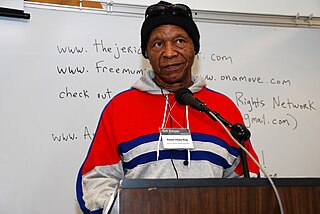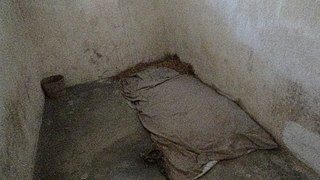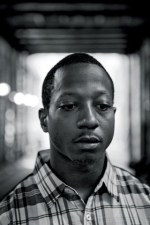
Solitary confinement is a form of imprisonment in which an incarcerated person lives in a single cell with little or no contact with other people. It is a punitive tool used within the prison system to discipline or separate incarcerated individuals who are considered to be security risks to other incarcerated individuals or prison staff, as well as those who violate facility rules or are deemed disruptive. However, it can also be used as protective custody for incarcerated individuals whose safety is threatened by other prisoners. This is employed to separate them from the general prison population and prevent injury or death.

Evin Prison is a prison located in the Evin neighborhood of Tehran, Iran. The prison has been the primary site for the housing of Iran's political prisoners since 1972, before and after the Iranian Revolution, in a purpose-built wing nicknamed "Evin University" due to the number of students and intellectuals housed there. Evin Prison has been accused of committing "serious human rights abuses" against its political dissidents and critics of the government.

Rikers Island is a 413-acre (167.14-hectare) prison island in the East River in the Bronx that contains New York City's largest jail.
Robert John Maudsley is an English man convicted of multiple murders. Maudsley killed four people, with one of the killings taking place in a psychiatric hospital and two in prison after receiving a life sentence for a murder. Initial reports falsely stated he ate part of the brain of one of the men he killed in prison, which earned him the nickname "Hannibal the Cannibal" from parts of the British press and "The Brain Eater" amongst other prisoners. National newspapers were advised that the allegations were untrue, according to the post-mortem report. Maudsley is the longest-serving British prisoner in solitary confinement.
James Fowler Ridgeway was an American investigative journalist. In a career spanning six decades, he covered many topics including automobile industry safety, American universities, far-right movements including the Ku Klux Klan and Neo-Nazism, and campaigns against solitary confinement. He was the Washington correspondent for The Village Voice for over 30 years between the mid-1970s to mid-2000s, and had also worked for The New Republic, and Mother Jones. He had also contributed to magazines and newspapers including The New York Times, The New York Review of Books, The Wall Street Journal, and The Economist among others.

The Angola Three are three African-American former prison inmates who were held for decades in solitary confinement while imprisoned at Louisiana State Penitentiary. The latter two were indicted in April 1972 for the killing of a prison corrections officer; they were convicted in January 1974. Wallace and Woodfox served more than 40 years each in solitary, the "longest period of solitary confinement in American prison history".

Nathan Burl Cain is the commissioner of the Mississippi Department of Corrections and the former warden at the Louisiana State Penitentiary at Angola in West Feliciana Parish, north of Baton Rouge, Louisiana. He worked there for twenty-one years, from January 1995 until his resignation in 2016.

On July 31, 2009, three Americans, Joshua Fattal, Sarah Shourd and Shane Bauer were taken into custody by Iranian border guards for crossing into Iran while hiking near the Iranian border in Iraqi Kurdistan.
Sarah Shourd is an American journalist, author and playwright. She is known for being an advocate against the overuse of solitary confinement in prisons. In 2009-10 she was held as a political hostage in Iran's Evin Prison for 410 days under accusations of espionage. She subsequently coauthored a book about the experience with her fellow hostages Josh Fattal and Shane Bauer. On Sept 14, 2010, the Iranian government released Shourd to the care of the Omani government. Shourd did her Bachelors of Arts in 2001 from University of Berkeley. She was also a UC Berkeley Visiting Scholar in 2014.

Reginald Dwayne Betts is an American poet, legal scholar, educator and prison reform advocate. At age 16 he committed an armed carjacking, was prosecuted as an adult, and was sentenced to nine years in prison. He started reading and writing poetry during his incarceration. After his release, Betts earned an M.F.A. in Creative Writing from Warren Wilson College, and a Juris Doctor degree from Yale Law School. He served on President Barack Obama’s Coordinating Council of the Office of Juvenile Justice and Delinquency Prevention. He founded Freedom Reads, an organization that gives incarcerated people access to books. In September 2021, Betts was awarded a MacArthur Fellowship. He is currently working on a PhD in Law at Yale University.

Robert Hillary King, also known as Robert King Wilkerson, is an American known as one of the Angola Three, former prisoners who were held at Louisiana State Penitentiary in solitary confinement for decades after being convicted in 1973 of prison murders.
Solitary Watch is a web-based project that aims to bring public attention to the widespread use of solitary confinement in the United States. Its mission is to provide the public—as well as practicing attorneys, legal scholars, law enforcement, and people in prison and their families—with a reputable source of unfolding news, original reporting, firsthand accounts, and research on solitary confinement and other harsh prison conditions to generate public debate and policy change.

The 2013 California prisoner hunger strike started on July 8, 2013, involving over 29,000 inmates in protest of the state's use of solitary confinement practices and ended on September 5, 2013. The hunger strike was organized by inmates in long term solitary in the Security Housing Unit (SHU) at Pelican Bay State Prison in protest of inmates housed there that were in solitary confinement indefinitely for having ties to gangs. Another hunger strike that added to the movement started the week before in High Desert State Prison. The focus of the High Desert State Prison hunger strike was to demand cleaner facilities, better food and better access to the library.

In the United States penal system, upwards of 20 percent of state and federal prison inmates and 18 percent of local jail inmates are kept in solitary confinement or another form of restrictive housing at some point during their imprisonment. Solitary confinement (sometimes euphemistically called protective custody, punitive segregation (PSEG) or room restriction) generally comes in one of two forms: "disciplinary segregation," in which inmates are temporarily placed in solitary confinement as punishment for rule-breaking; and "administrative segregation," in which prisoners deemed to be a risk to the safety of other inmates, prison staff, or to themselves are placed in solitary confinement for extended periods of time, often months or years.

Kalief Browder was an African American youth from The Bronx, New York, who was held at the Rikers Island jail complex, without trial, between 2010 and 2013 for allegedly stealing a backpack containing valuables. During his imprisonment, Browder was kept in solitary confinement for 800 days.
While studies have shown the effects of solitary confinement to be detrimental to some inmates, solitary confinement of women has particular consequences for women that may differ from the way it affects men. Solitary confinement rates for women in the United States are roughly comparable to those for men and about 20% of prisoners will be in solitary confinement at some point during their prison career.
Thomas Bartlett Whitaker is an American convicted under the Texas law of parties of murdering two family members as a 23-year-old. Whitaker was convicted on December 10, 2003, for the murders of his mother and 19-year-old brother; he was sentenced to death in March 2007. He spent years on death row at the Polunsky Unit near Livingston, Texas, before the commutation of his sentence.
Minutes Before Six is an American blog that publishes articles, poetry and art from inmates held in prison in the United States. The website was founded by former Texas death row inmate Thomas Bartlett Whitaker with the help of volunteers in the free world. The name of the website refers to the hour at which executions start to take place in Texas. The website provides a channel for prisoners to express themselves to the outside world.

Caged is a 2020 American drama film directed by Aaron Fjellman and starring Edi Gathegi, Melora Hardin, Angela Sarafyan and Tony Amendola. Fjellman co-wrote the screenplay with James 'Doc' Mason. The film was produced by Pete Kirtley, Aaron Fjellman, Matthew Temple and Jessa Zarubica.

Terry Allen Kupers M.D., M.S.P. is a psychiatrist and expert on correctional mental health and the detrimental effects of solitary confinement. He is known for his expertise in the fields of psychoanalytic psychotherapy, forensic psychiatry, and community mental health. He is Professor Emeritus at the Wright Institute in Berkeley, California. His forensic psychiatry experience includes testimony in multiple large class action lawsuits concerning jail and prison conditions, sexual abuse behind bars, and the quality of mental health services within correctional facilities.













